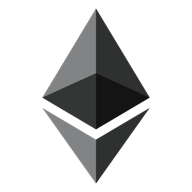About MathWallet
MathWallet is the Multichain Wallet for Web3 that enables token storage of 100+ chains including BTC, ETH, Polkadot, Filecoin, Solana, BSC, Cosmos etc, supports cross-chain token bridges and multi-chain dApp store. Our investors includes Fenbushi Capital, Alameda Research, Binance Labs, FundamentalLabs, Multicoin Capital, NGC Ventures, Amber Group, 6Eagle Capital.
What is Ethereum?
Ethereum is a public, open-source, peer-to-peer network of virtual machines. It is a blockchain-based distributed computing platform and operating system featuring smart contract functionality. In other words, it is a decentralized supercomputer that anyone can use. Ethereum is most frequently used to track the ownership of digital currencies like Ether and ERC20 tokens. But it also supports a wide range of decentralized applications (dApps).
How does it work?
The Ethereum blockchain is similar to Bitcoin, but its programming language enables developers to write programmable code, called smart contracts. If a traditional contract outlines the terms of a relationship, a smart contract ensures those terms are fulfilled by writing it in code. It is software that automatically executes the agreement as soon as predefined conditions are met, eliminating the delay and expense involved in completing a deal manually. To take a simple example, an Ethereum user could create a smart contract to send a certain amount of ether to a friend on a certain date. They would write this code into the blockchain, and as soon as the contract is complete – that is, the agreed date arrives – the ether would automatically be released to the other party. This fundamental idea can be applied to far more complex setups, and its potential is arguably limitless, with projects already making headway in the areas of insurance, property, financial services, legal and crowdfunding.
What are the features of Ethereum?
Smart Contracts
Vitalik Buterin expanded on Bitcoin secure transaction technology and found on an abstract level that a transaction in itself is secured with a contract. The contract is an agreement between two parties securing the promise of a one- or two-way exchange. He designed the Ethereum Virtual Machine with this in mind; that any transaction over the blockchain network should be self-executed once agreed upon by both parties and should be recorded on a public blockchain ledger. This self-execution is what makes these contracts “smart,” and thereby opened up an entirely new universe for business accountability and in turn a new economy. Smart contracts benefits:
- They cut out the middleman, giving the user complete control and minimise extra costs
- They are recorded, encrypted and duplicated on the public blockchain, where all participants can see market activity
- They eliminate the time and effort required to manually process documents. Smart contracts are still an entirely new system with a number of creases to improve. The code is translated literally, and any errors or vulnarability when the smart contract is created may result in unintended outcomes which can’t be undone and could lead to loss of funds.
Decentralized Applications
A decentralized application (dApp) is an application run by many users/nodes on a fully decentralized network with trustless protocols. dApps are designed to avoid any single point of failure and control. They typically have tokens and incentives to reward users for providing computing power.
https://ethereum.org/



